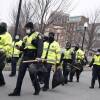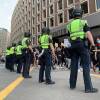The state passed a historic police oversight law at the end of 2020. Now, just over a year later, many of the provisions in that law are still waiting to take effect, and some of the unfinished work in the bill that lawmakers passed is still being debated and delayed. Mike Deehan, GBH State House reporter, joined Henry Santoro on Morning Edition to discuss the status of the reform. This interview has been edited for clarity and length.
Henry Santoro: The biggest unresolved issue from the police reform debate was how the state would deal with qualified immunity for police officers. That's the legal protections that officers get from civil lawsuits resulting from incidents that they were involved in. Where does this thing stand?
Mike Deehan: Honestly, it stands pretty much exactly where lawmakers left it at the end of 2020, when that law was passed and signed by the governor. During that debate, which of course was happening during the summer and fall of 2020, all the lawmakers faced huge amounts of pushback from their own local police back home in their districts, police unions that are very powerful lobbies up on Beacon Hill and really, they heard a lot from their own constituents on whether or not to touch qualified immunity.
Of course, the other side of that is a lot of criminal justice and social justice advocates who think that ending qualified immunity or at least limiting it is one huge way to add to police accountability. The law, as passed, does eliminate some of those protections for officers that have been decertified by the new board that the law established, but it retained protections for all those officers that are still on the force.
What it boils down to is that the House and the Senate simply couldn't agree on whether to cut back on these protections. The Senate wanted to reduce them more. The House really didn't want to budge. So, the compromise that they hit upon in 2020 was to establish a commission to look into the matter and to make recommendations by the end of 2021. So that report just came out last week — late, but not super late. And that report recommends waiting another two years before the Legislature should really do anything regarding qualified immunity.
Santoro: Is this another instance of the Legislature just waiting or, dragging their feet to get this thing done simply because the House or the Senate can't agree?
Deehan: It definitely seems to have be a little bit of that. Or at least that's definitely a big component here. Nothing in this report was unanimous between the House members and the Senate members, so it really does seem like pushing it back was all that they could manage to do.
This is the kind of intractability that we see in so many issues between the House and the Senate — neither of them budging, neither compromising. And really nothing gets done. In this case, they say, "hey, let's get another two years." But, in their defense, they say that they want to see how the new law changes these things.
So, we're having this historic law and there is a lot more police oversight in Massachusetts — these officers are getting certified and the trainings [are] being certified and they are potentially being decertified. So, having that oversight could change the dynamics here, and that's what they say they're going to use these two years to explore.
Santoro: How do activists on the Hill see the report's findings and this two year delay? I mean, two years is a long time.
Deehan: This is certainly a win for those police unions who have really fought tooth and nail over the last couple of years to stop any changes to qualified immunity. But on the other side, progressive groups that were looking for changes, places like the ACLU, Lawyers for Civil Rights, they're saying that this is a complete failure by the Legislature to do what they said they were going to do. They expected the commission to make some solid recommendations. Instead, they really just bought themselves another two years.
"This is certainly a win for those police unions who have really fought tooth and nail over the last couple of years to stop any changes to qualified immunity."-Mike Deehan, GBH State House reporter
Santoro: The state's police oversight law was a legitimate watershed moment in how just about every state in the country reacted to the national outcry over the deaths of unarmed Black men and women in altercations with police. What did it change?
Deehan: It should be stated how important this law was. Just because the qualified immunity issue was the diciest issue, the law itself has really been a kind of a first-in-the-nation way to oversee how police operate in the state. It created the police standards and training board — that's that new board that is going to certify, and more importantly, decertify police if they're found guilty of violating new rules, which includes a whole bunch of new standing measures, measures on tactics, things like that. So, this law really did strengthen a lot of the oversight that already existed and put in place this new board that's going to really run the show as far as standards, practices, tactics.
But as we've seen, it didn't cover everything. And so now many in the legal reform community and the Black community and criminal justice and social justice communities, they really wanted to see some changes made in the law that didn't really get there. And we're still seeing the fallout from that because they didn't really get to that qualified immunity issue.









